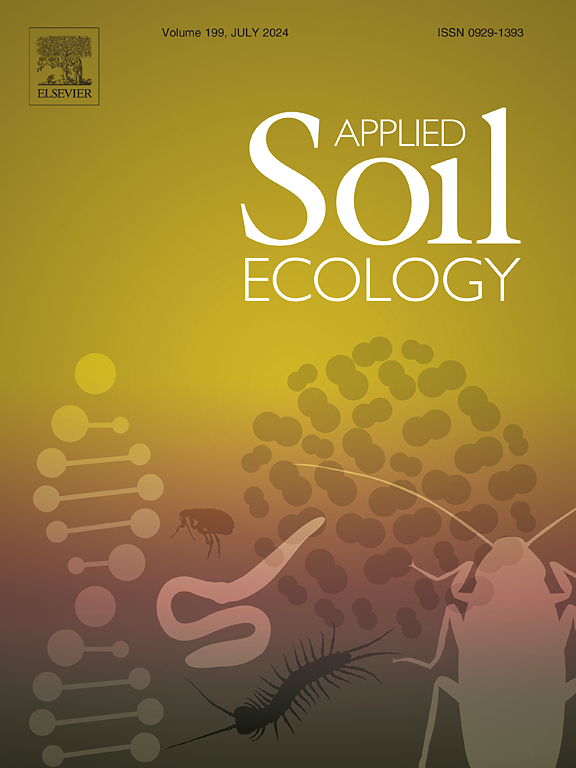Impacts of spent mushroom substrate amendment and season on microbial communities in a semiarid vineyard soil
IF 4.8
2区 农林科学
Q1 SOIL SCIENCE
引用次数: 0
Abstract
Spent mushroom substrate (SMS) amendment provides multiple benefits to the soil and therefore can increase the sustainability of agroecosystems. However, very little is known on how SMS fertilization can affect microbial community diversity and composition. To bridge this gap, we collected soils in two seasons (Spring and Autumn) from replicated plots with two doses of SMS (25 and 100 Mg ha−1) maintained at a vineyard in La Rioja, Spain. Using Illumina sequencing of both the 16S rRNA gene and the ITS, we found that the changes in soil chemistry, as a consequence of SMS amendment, did not influence microbial alpha-diversities, but shaped bacterial beta-diversity regardless of the season. This implies that bacterial beta-diversity patterns remain consistently stable across treatments over time. However, our research also underscores the significant role of seasonal dynamics in shaping the structure and composition of microbial communities, as we noted a noteworthy decrease in beta-diversity during Autumn (after the dry summer) compared to Spring. The resulting biotic homogenization of both fungal and bacterial communities led to reduced relative abundances of N-fixing bacteria, as well as fungal and bacterial pathogens in Autumn as opposed to Spring. Altogether, our findings indicate that vineyard soil microbial communities are influenced by both resource availability and the varying environmental conditions. This information is essential for steering soil microbial communities to enhance plant productivity. The results of this study may contribute to more effective management of Mediterranean vineyards in accordance with the principles of the circular economy.
废蘑菇基质添加剂和季节对半干旱葡萄园土壤微生物群落的影响
废蘑菇基质(SMS)改良剂可为土壤带来多种益处,从而提高农业生态系统的可持续性。然而,人们对 SMS 施肥如何影响微生物群落多样性和组成知之甚少。为了填补这一空白,我们在西班牙拉里奥哈的一个葡萄园中,分春秋两季从施用两种剂量 SMS(25 毫克/公顷-1 和 100 毫克/公顷-1)的重复地块中采集了土壤。通过对 16S rRNA 基因和 ITS 进行 Illumina 测序,我们发现土壤化学成分的变化不会影响微生物的α-多样性,但会影响细菌的β-多样性,与季节无关。这意味着细菌的贝塔多样性模式在不同的处理方法中会随着时间的推移保持稳定。不过,我们的研究也强调了季节动态在塑造微生物群落结构和组成方面的重要作用,因为我们注意到,与春季相比,秋季(干燥的夏季之后)的贝塔多样性明显减少。由此造成的真菌和细菌群落的生物同质化导致秋季固氮菌以及真菌和细菌病原体的相对丰度低于春季。总之,我们的研究结果表明,葡萄园土壤微生物群落受资源可用性和不同环境条件的影响。这些信息对于指导土壤微生物群落以提高植物生产力至关重要。这项研究的结果可能有助于按照循环经济的原则对地中海葡萄园进行更有效的管理。
本文章由计算机程序翻译,如有差异,请以英文原文为准。
求助全文
约1分钟内获得全文
求助全文
来源期刊

Applied Soil Ecology
农林科学-土壤科学
CiteScore
9.70
自引率
4.20%
发文量
363
审稿时长
5.3 months
期刊介绍:
Applied Soil Ecology addresses the role of soil organisms and their interactions in relation to: sustainability and productivity, nutrient cycling and other soil processes, the maintenance of soil functions, the impact of human activities on soil ecosystems and bio(techno)logical control of soil-inhabiting pests, diseases and weeds.
 求助内容:
求助内容: 应助结果提醒方式:
应助结果提醒方式:


